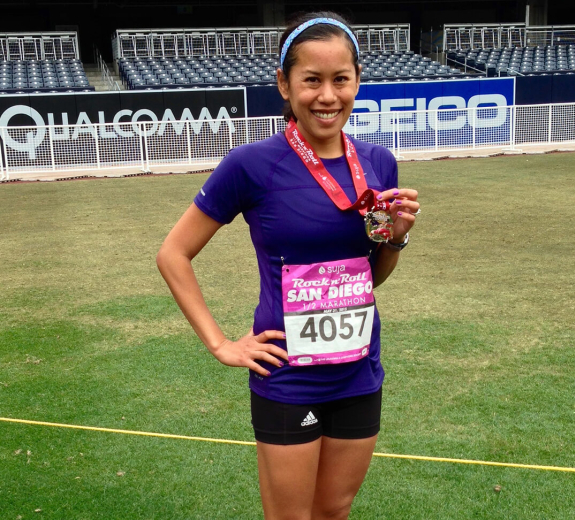
Marathon Runner Fights MS
Forty-year-old Cheryl Hile runs marathons, bicycles and holds a demanding full-time job—impressive accomplishments but, on the surface, not especially remarkable in this day and age.
Cheryl, however, is remarkable. She engages in these strenuous activities despite a dropped foot, weakened thigh muscles, fatigue and a “creepy-crawly” feeling in her body—all symptoms of multiple sclerosis (MS). MS is an autoimmune disease in which the body’s immune system destroys myelin, the protective sheath that covers nerve fibers. This affects the brain and spinal cord, leading to pain and disability.
“I was so depressed after receiving a diagnosis of MS,” she says. “I didn’t know anything about the disease except that I had a co-worker in a wheelchair and thought that was my future. But I kept on running and exercising because that was my stress reliever, where I could be myself.”
In keeping with her take-charge personality, Cheryl did extensive research on the disease and the best places for treatment and research. She soon discovered Virginia Mason Medical Center and Benaroya Research Institute at Virginia Mason (BRI). In partnership with Virginia Mason, BRI’s team of expert scientists is focused on identifying causes and cures for MS and other devastating autoimmune diseases.
Cheryl and her husband moved to Seattle so that she could become a patient of Mariko Kita, MD, BRI clinical investigator, director of the Virginia Mason Multiple Sclerosis Center and head of the Department of Neurology at Virginia Mason. From their first meeting, Cheryl knew Dr. Kita was right for her.
“Dr. Kita is very compassionate and doesn’t talk down to you,” Cheryl says. “She gives me information so that I can make my own choices and doesn’t tell me what to do. And she is very willing to help keep me active and running.”
Biorepository Participant
Even though she has moved back to San Diego, Cheryl continues to see Dr. Kita. She also participates in BRI’s MS biorepository. A biorepository consists of blood and tissue samples linked to medical and demographic information collected from people with a specific disease or condition. Researchers use this information to better understand progression of diseases and possible therapies, accelerating the translation of discoveries from the lab to the patient.
“Through the biorepository, researchers at BRI discovered a biomarker for MS that can be used as a target for new therapies,” she says. “What I hope for is better treatments for MS and I would really like to see a cure, so if it means regularly donating a small amount of blood, then I will gladly extend my arm!”

BRI and Virginia Mason have participated in more than 30 clinical studies that have advanced MS treatment including FDA approval of new therapies shown on this chart. One of the most promising new areas of research lies in remyelination—reversing damage and growing back nerves. BRI and VM are now testing a new molecule for the first time in humans that has been shown to repair and reduce lesions.
Immuno-what? Hear the latest from BRI
Keep up to date on our latest research, new clinical trials and exciting publications.


